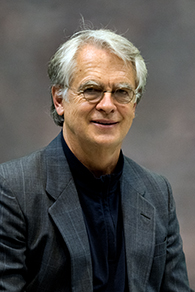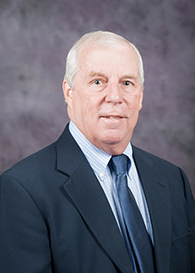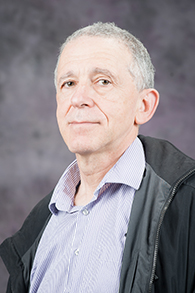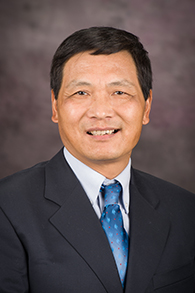Five faculty members named newest university distinguished professors
Monday, May 1, 2017
MANHATTAN — Kansas State University is honoring five professors as 2017 university distinguished professors, a lifetime title that is the highest honor the university bestows on its faculty members.
The following professors are receiving the distinction: Phillip Klebba, professor and head of biochemistry and molecular biophysics; Timothy Musch, professor of kinesiology and anatomy and physiology; Anil Pahwa, professor of electrical and computer engineering; Yan Soibelman, professor of mathematics; and Kun Yan Zhu, professor of entomology.
"Our five newest university distinguished professors truly display high-caliber leadership in teaching, research and service," said April Mason, university provost and senior vice president. "Their accomplishments are key in our goal to become a Top 50 public research university by 2025, and I want to congratulate them on their newest achievement in becoming university distinguished professors."
The distinguished professors are appointed following a universitywide nomination and evaluation process conducted by the provost. All five faculty members will receive a personalized plaque and medallion at the university's fall 2017 commencement ceremonies.
Phillip Klebba
Klebba is the head of the biochemistry and molecular biophysics department. His research focuses on three areas: iron acquisition by active transport through the cell envelopes of bacteria, novel antibiotics against bacterial pathogenesis and biophysical analyses of bacterial membrane transport in living cells.
Klebba came to Kansas State University in 2012. His research and collaborative projects have garnered more than $9 million in continuous research funding since 1986, from organizations such as the National Institutes of Health and the National Science Foundation. He has more than 84 publications.
For several decades he has served as a referee for funding agencies and scientific journals. He is a managing editor for Frontiers in Bioscience and served as an editorial board member for the Journal of Biomedicine and Biotechnology and for Advances in Biological Chemistry.
Klebba spent 2002 to 2003 as a Fulbright scholar at Institut Necker Enfants Malades in Paris. He remains involved with the Fulbright Scholar Program of the U.S. State Department and is a biochemistry specialist for the program's Council for Exchange of International Scholars. In 2001 he was an international professor of the American Society for Microbiology at the University of São Paulo in Brazil.
He is a member of the American Association for the Advancement of Science, the American Society for Microbiology and the American Society of Biochemistry and Molecular Biology. Some of his career accolades include receiving the 1981 Evelyn Neizer Post-Doctoral Research Award from Stanford University, Phillipe Foundation International Scholar awards in 1993 and 2002, and a 2011 Burroughs-Wellcome Research Scholar Award at the University of California, Los Angeles.
Klebba obtained his bachelor's degree in biology from the University of Notre Dame in 1975, earned his doctorate in biochemistry from the University of California, Berkeley in 1982, and performed postdoctoral research at Stanford University and at the University of California, Berkeley from 1982 to 1984.
Timothy Musch
Musch is a faculty member in the departments of kinesiology as well as anatomy and physiology. He is the co-director of the College of Veterinary Medicine's Cardiorespiratory Exercise Physiology Research Laboratory. His research interests include the mechanisms associated with exercise performance in health and disease focusing on chronic heart failure.
He came to Kansas State University in 1993 and served as the College of Human Ecology's interim associate dean for research and scholarship from 2013-2015. He has received more than $4.8 million in research funding from a variety of national organizations, including the National Institutes of Health and the American Heart Association. He has published nearly 200 peer-reviewed journals and book chapters and his work has been cited more than 7,000 times.
Musch is a fellow of the American College of Sports Medicine and the American Physiological Society. He also is a member of the American Heart Association and has served on the Scientific Advisory Council for the American Federation for Aging Research.
He has provided service to numerous national scientific organizations, including NASA, the American College of Sports Medicine, the American Physiological Society and the National Institutes of Health. He has been an associate editor and manuscript reviewer for several journals.
He received the national New Investigator Award in 1986 and the national Citation Award in 2013 from the American College of Sports Medicine. He also received the national Arthur C. Guyton Educator of the Year Award from the American Physiological Society in 2013. At Kansas State University, he has received the 1998 Presidential Award for Undergraduate Teaching and the 2014 Zoetis Award for Excellence in Research.
Musch was a postdoctoral fellow in cardiovascular physiology at the University of Texas Health Science Center at Dallas, now the University of Texas Southwestern Medical School. He earned his doctorate in exercise physiology from the University of Wisconsin, Madison in 1981 and his master's and bachelor's degrees in physical education from the University of California, Berkeley in 1974 and 1972.
Anil Pahwa
Pahwa holds the Logan-Fetterhoof electrical and computer engineering faculty of distinction chair. His research focuses on reliability, automation and optimization of power distribution systems. His work has provided innovative and practical solutions for electricity distribution as well as large-scale integration of renewable energy resources in the system to decrease dependence on fossil fuels.
Pahwa joined Kansas State University in 1983. He served as the electrical and computer engineering department head from 2004 to 2007. He has engaged in 38 funded research projects with about $8.8 million in total funding, largely from the National Science Foundation. He has been the lead principal investigator on 28 of these projects. Pahwa has published more than 225 articles and reports with more than 60 refereed journal papers and his research has received more than 2,400 citations.
Pahwa is an Institute of Electrical and Electronics Engineers, or IEEE, fellow and has served in many leadership positions in IEEE Power and Energy Society, or PES, during the past 20 years, including chair of the Power and Energy Education Committee and editor of IEEE Transactions on Power Systems.
He has served on the advisory committee of DistribuTECH, a premier conference focused on automation of power distribution systems, for more than 25 years. The National Academies selected Pahwa for a 2014-2015 Jefferson Science Fellowship and he served as a senior scientific adviser in the Economic Policy Office of the State Department's Bureau of East Asian and Pacific Affairs as a part of the fellowship.
Pahwa has received several awards during his professional career, including the IEEE PES Douglas M. Staszesky Distribution Automation Award in 2012 and the Outstanding Alumni Award from Birla Institute of Technology and Science in 2014. At Kansas State University he received the College of Engineering's Erickson Public Service Award in 2011 and Frankenhoff Outstanding Research Award in 2012.
Pahwa earned his doctorate in electrical engineering from Texas A&M University in 1983; his master's degree in electrical engineering from the University of Maine, Orono in 1979; and his bachelor's degree in electrical engineering from Birla Institute of Technology and Science in Pilani, India, in 1975.
Yan Soibelman
Soibelman is director of the university's M-Center for Mirror Symmetry and Tropical Geometry. He researches algebra, deformation theory, algebraic geometry, topology, symplectic geometry, representation theory, non-commutative geometry, differential equations, mathematical physics and string theory.
He joined Kansas State University in 1994. He has received 27 grants and awards. His work has received support from the National Science Foundation, the Max Planck Institute for Mathematics, Clay Mathematics Institute and the International Congress of Mathematicians. His research has appeared in 70 publications, monographs and proceeding volumes.
Soibelman has been a referee and editor for 21 publications and organizations, including the National Science Foundation, the National Security Agency and the European Research Council. He has given more than 175 conference presentations and lectures across the world. He has been an invited speaker at more than 50 regional and national conferences in Russia and the United States.
He was a Clay Mathematics Institute fellow and a member of the American Mathematical Society, and he is a member of the Kiev Mathematical Society in Ukraine. He holds a distinguished visiting research chair at the Perimeter Institute for Theoretical Physics in Waterloo, Canada.
Throughout his career, he has been a visiting scholar or professor at Cambridge University in the U.K.; Massachusetts Institute of Technology; Harvard University; the Institute for Advanced Study in Princeton, New Jersey; the Institute of Advanced Research in Bures-sur-Yvette, France; Research Institute for Mathematical Sciences in Kyoto, Japan; and the Max Planck Institute for Mathematics in Bonn, Germany, among other institutions.
Soibelman received his doctorate in 1985 and his master's degree in 1978, both in mathematics from Rostov University, now Southern Federal University in Russia.
Kun Yan Zhu
Zhu has an international reputation in insect toxicology and molecular biology and his research spans from basic to applied studies. He has collaborated with more than 50 scientists in the U.S. and around the world throughout his career.
He discovered a new insecticide target gene in a major agricultural insect pest, which was cited as "a breakthrough in this toxicological riddle" by his international peers. He received a U.S. patent in 2014 for developing genetics-based insect pest management strategies.
Zhu came to Kansas State University in 1996. He has been involved in research projects that have received a total of more than $7.6 million in funding, primarily from the U.S. Department of Agriculture. He has served as an editor and editorial board member for 12 scientific journals and has peer-reviewed 395 manuscripts for 63 international journals. His research has appeared in 153 peer-reviewed publications and more than 350 presentations. He has authored 13 books and book chapters. His research has been cited more than 4,400 times.
Zhu is a 2012 fellow of the American Association for the Advancement of Science and a 2014 fellow of the Entomological Society of America. He also is a member of the American Chemical Society and will be the 2018 vice president-elect for the Insect Physiology, Biochemistry and Physiology section of the Entomological Society of America.
He has received several noteworthy awards for his research and teaching. Zhu received Kansas State University's 2014 Commerce Bank and W.T. Kemper Foundation Distinguished Graduate Faculty Award and 2016 College of Agriculture Excellence inGraduate Teaching Award.
Zhu was a postdoctoral research associate at the University of Massachusetts. He earned his master's degree and doctorate in biology from Utah State University in 1989 and 1992, respectively, and his bachelor's degree in plant protection from Zhejiang University in China in 1982.





